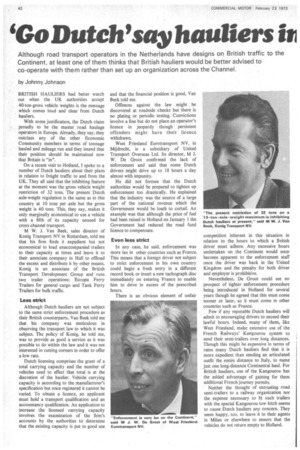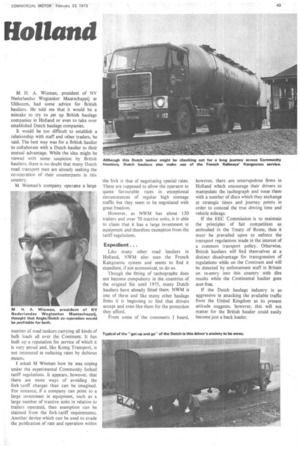'Go Dutch' say hauliers hi
Page 42

Page 43

If you've noticed an error in this article please click here to report it so we can fix it.
Rolland
Although road transport operators in the Netherlands have designs on British traffic to the Continent, at least one of them thinks that British hauliers would be better advised to co-operate with them rather than set up an organization across the Channel.
by Johnny Johnson
BRITISH HAULIERS had better watch out when the UK authorities accept 40-ton-gross vehicle weights is the message which comes loud and clear from Dutch hauliers.
With some justification, the Dutch claim proudly to be the master road haulage operators in Europe. Already, they say, they outclass any of the other Economic Community members in terms of tonnage hauled and mileage run and they intend that their position should be maintained now that Britain is "in".
On a recent visit to Holland, I spoke to a number of Dutch hauliers about their plans in relation to freight traffic to and from the UK. They all said that the inhibiting feature at the moment was the gross vehicle weight restriction of 32 tons. The present Dutch axle-weight regulation is the same as in this country at 10 tons per axle but the gross weight is 40 tons. This, they say, makes it only marginally economical to use a vehicle with a fifth of its capacity unused for cross-channel transport.
M W. 1. Van Beek, sales director of Konig Transport NV in Rotterdam, told me that his firm finds it expedient but not economical to load unaccompanied trailers to their capacity at times and leave it to their associate company in Hull to offload the excess and distribute it by other means. Konig is an associate of the British Transport Development Group and runs two trailer operations: Europa Ferry Trailers for general cargo and Tank Ferry Trailers for bulk traffic.
Less strict
Although Dutch hauliers are not subject to the same strict enforcement procedure as their British counterparts, Van Beek told me that his company was meticulous in observing the transport law to which it was subject. The policy of Konig, he told me, was to provide as good a service as it was possible to do within the law and it was not interested in cutting corners in order to offer a low rate.
Dutch licensing comprises the grant of a total carrying capacity and the number of vehicles used to effect that total is at the discretion of the haulier. Vehicle carrying capacity is according to the manufacturer's specification but once registered it cannot be varied. To obtain a licence, an applicant must hold a transport qualification and an accountancy qualification. An application to increase the licensed carrying capacity involves the examination of the firm's accounts by the authorities to determine that the existing capacity is put to good use and that the financial position is good, Van Beek told me.
Offences against the law might be discovered at roadside checks but there is no plating or periodic testing. Convictions involve a fine but do not place an operator's licence in jeopardy though persistent offenders might have their licence withdrawn.
West Friesland Eurotransport NV, in Mijdrecht, is a subsidiary of United Transport Overseas Ltd. Its director, M W. De Groot confirmed the lack of enforcement and said that some Dutch drivers might drive up to 18 hours a day almost with impunity.
He did not foresee that the Dutch authorities would be prepared to tighten up enforcement too drastically. He explained that the industry was the source of a large part of the national revenue which the Government would be loath to curtail. An example was that although the price of fuel had been raised in Holland on January 1 the Government had reduced the road fund licence to compensate.
Even less strict In any case, he said, enforcement was more lax in other countries such as France. This means that a foreign driver not subject to strict enforcement in his own country could begin a fresh entry in a different record book or insert a new tachograph disc immediately on entering France to enable him to drive in excess of the prescribed hours.
There is an obvious element of unfair competition inherent in this situation in relation to the hours to which a British driver must adhere. Any excessive hours undertaken on the Continent would soon become apparent to the enforcement staff once the driver was back in the United Kingdom and the penalty for both driver and employer is prohibitive.
Nevertheless, De Groot could see no prospect of tighter enforcement procedure being introduced in Holland for several years though he agreed that this must come sooner or later, as it must come in other countries such as France.
Few if any reputable Dutch hauliers will admit to encouraging drivers to exceed their lawful hours. Indeed, many of them, like West Friesland, make extensive use of the French Railways' Kangourou system to send their semi-trailers over long distances. Though this might be expensive in terms of rates many Dutch hauliers find that it is more expedient than sending an articulated outfit the entire distance to Italy, to name just one long-distance Continental haul. For British hauliers, use of the Kangourou has the added advantage of gaining for them additional French journey permits.
Neither the thought of entrusting road semi-trailers to a railway organization nor the expense necessary to fit such trailers with the special Kangourou tow hitch seems to cause Dutch hauliers any concern. They seem happy, too, to leave it to their agents in Milan or elsewhere to ensure that the vehicles do not return empty to Holland. M H. A. Wisman, president of NV Nederlandse Wegtanker Maatschappij at Uithoorn, had some advice for British hauliers. He told me that it would be a mistake to try to set up British haulage companies in Holland or even to take over established Dutch haulage companies.
It would be too difficult to establish a relationship with staff and other traders, he said. The best way was for a British haulier to collaborate with a Dutch haulier to their mutual advantage. While the idea might be viewed with some suspicion by British hauliers, there is no doubt that many Dutch road transport men are already seeking the co-operation of their counterparts in this country.
M Wisman's company operates a large number of road tankers carrying all kinds of bulk loads all over the Continent. It has built up a reputation for service of which it is very proud and, like Konig Transport, is not interested in reducing rates by dubious means.
I asked M Wisman how he was coping under the experimental Community forked tariff regulations. It appears, however, that there are more ways of avoiding the fork-tariff charges than can be imagined. For instance, if a company can point to a large investment in equipment, such as a large number of tractive Units in relation to trailers operated, then exemption can be claimed from the fork-tariff requirements. Another device which can be used to evade the publication of rate and operation within the fork is that of negotiating special rates. These are supposed to allow the operator to quote favourable rates in exceptional circumstances of regular high tonnage traffic but they seem to be negotiated with great freedom.
However, as NWM has about 130 trailers and over 70 tractive units, it is able to claim that it has a large investment in equipment and therefore exemption from the tariff regulations.
Expedient Like many other road hauliers in Holland, NWM also uses the French Kangourou system and seems to find it expedient, if not economical, to do so.
Though the fitting of tachographs does not become compulsory in the countries of the original Six until 1975, many Dutch hauliers have already fitted them. NWM is one of these and like many other haulage firms it is beginning to find that drivers accept and even like them for the protection they afford.
From some of the comments I heard, however, there are unscrupulous firms in Holland which encourage their drivers to manipulate the tachograph and issue them with a number of discs which they exchange at strategic times and journey points in order to conceal the true driving time and vehicle mileage.
If the EEC Commission is to maintain the principles of fair competition as embodied in the Treaty of Rome, then it must be prevailed upon to enforce the transport regulations made in the interest of a common transport policy. Otherwise, British hauliers will find themselves at a distinct disadvantage for transgression of regulations while on the Continent and will be detected by enforcement staff in Britain on re-entry into this country with dire results while the Continental haulier goes scot-free.
If the Dutch haulage industry is as aggressive in attacking the available traffic from the United Kingdom as its present attitude suggests, however, this will not matter for the British haulier could easily become just a back loader.
































































































